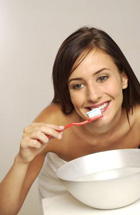 Your heart- just consider that for a moment you lovely people of Leeds….it pumps the blood around your veins, it helps to regulate your breathing, and isn’t it wonderful when it misses a beat when you fall in love? Well then damn well look after it because it is the very core of your existence and what you do to your body on a daily basis is vital. Diet and your teeth are also an important part of the equation because they can also impact on the heart. Keeping your teeth and gums healthy can have detrimental effects throughout the body so it is vital that you get up to speed and check with your dentist that you are getting this right and looking after your teeth the right way. Why, well here’s the reason- gum disease; this can start to poison you and your blood. You may never be aware of it but over a lengthy period of time, constant poisoning can start to lead to a build up of nasties in the arteries and soon, the very heart of you will give up the ghost and start to falter. Good oral hygiene, regular dental appointments, good diet and a balanced lifestyle will ensure that when you are finally ready to stretch out on a beach in Tahiti in a beautiful retirement, your heart will be murmuring for all the right reasons!
Your heart- just consider that for a moment you lovely people of Leeds….it pumps the blood around your veins, it helps to regulate your breathing, and isn’t it wonderful when it misses a beat when you fall in love? Well then damn well look after it because it is the very core of your existence and what you do to your body on a daily basis is vital. Diet and your teeth are also an important part of the equation because they can also impact on the heart. Keeping your teeth and gums healthy can have detrimental effects throughout the body so it is vital that you get up to speed and check with your dentist that you are getting this right and looking after your teeth the right way. Why, well here’s the reason- gum disease; this can start to poison you and your blood. You may never be aware of it but over a lengthy period of time, constant poisoning can start to lead to a build up of nasties in the arteries and soon, the very heart of you will give up the ghost and start to falter. Good oral hygiene, regular dental appointments, good diet and a balanced lifestyle will ensure that when you are finally ready to stretch out on a beach in Tahiti in a beautiful retirement, your heart will be murmuring for all the right reasons!





 Okay, we’ve got the general idea of how to do the basics when looking after our teeth in central Leeds- good toothpaste and a good brush…that should do it. Well not quite so actually, because as is human nature, we can get a bit complacent by trusting the products we buy and be lazy in the knowledge that what is said on the packet is going to do the job. Not so, for all the best-laid plans can come unstuck: sometimes if you are a little dozy, you may not be quite getting into the places where you need to be with your toothbrush, which is why you need to floss as well. Flossing is an art-form in itself and the reasons behind it should be quite obvious; if you can learn how to get this right, and whatever it takes to do so- from your dentist or from going on-line, then you will be removing oddities from between your teeth and keeping your teeth and gums healthy. Things can get very radical in the mouth extremely quickly so the basics need to be backed with a drop of flossing to ensure you skip dangers such as tooth decay and gum disease and avoid a hefty bill at the dentists.
Okay, we’ve got the general idea of how to do the basics when looking after our teeth in central Leeds- good toothpaste and a good brush…that should do it. Well not quite so actually, because as is human nature, we can get a bit complacent by trusting the products we buy and be lazy in the knowledge that what is said on the packet is going to do the job. Not so, for all the best-laid plans can come unstuck: sometimes if you are a little dozy, you may not be quite getting into the places where you need to be with your toothbrush, which is why you need to floss as well. Flossing is an art-form in itself and the reasons behind it should be quite obvious; if you can learn how to get this right, and whatever it takes to do so- from your dentist or from going on-line, then you will be removing oddities from between your teeth and keeping your teeth and gums healthy. Things can get very radical in the mouth extremely quickly so the basics need to be backed with a drop of flossing to ensure you skip dangers such as tooth decay and gum disease and avoid a hefty bill at the dentists. Brushing and flossing your teeth can be a daunting task when you are faced with a mouth full of metal braces. However, it is even more important that you maintain proper oral hygiene because more food particles will get stuck in your teeth from wearing braces. With traditional metal braces, you must learn to maneuver your brushing and flossing without damaging the wires.
Brushing and flossing your teeth can be a daunting task when you are faced with a mouth full of metal braces. However, it is even more important that you maintain proper oral hygiene because more food particles will get stuck in your teeth from wearing braces. With traditional metal braces, you must learn to maneuver your brushing and flossing without damaging the wires.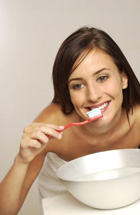 If a lot of you were being honest in central Leeds, you probably expect the dentist to bail you out of trouble if something goes wrong in your mouths and they’re only to willing to do so. But what you would imagine, is they must get pretty well fed up when they see that you have made no effort at all to look after your own teeth at home and it’s not like the opportunity isn’t being laid on a plate for you, what with all the products on the market to help you out. It starts with a good brush and toothpaste that suit you and any condition you may have in your mouth. Okay, you don’t always get it right at first but it’s important to persevere until you do. Then there are dental flosses to help back up the brushing process, as they can reach into the areas that you and your brush can’t. The important factor here is that you are removing any bits of food that may be stuck deep between the teeth and avoiding any build of bacteria and plaque. Then you should take advantage of using a mouthwash for extra protection. This should be enough to stave off any major problems until your next check-up. Once you get into a routine of doing this at least twice a day, it should become as natural as putting your clothes on. But most important, you should see yourself and your dentist as allies, two people that work in unison and that are in it together to protect the health of your mouth and body.
If a lot of you were being honest in central Leeds, you probably expect the dentist to bail you out of trouble if something goes wrong in your mouths and they’re only to willing to do so. But what you would imagine, is they must get pretty well fed up when they see that you have made no effort at all to look after your own teeth at home and it’s not like the opportunity isn’t being laid on a plate for you, what with all the products on the market to help you out. It starts with a good brush and toothpaste that suit you and any condition you may have in your mouth. Okay, you don’t always get it right at first but it’s important to persevere until you do. Then there are dental flosses to help back up the brushing process, as they can reach into the areas that you and your brush can’t. The important factor here is that you are removing any bits of food that may be stuck deep between the teeth and avoiding any build of bacteria and plaque. Then you should take advantage of using a mouthwash for extra protection. This should be enough to stave off any major problems until your next check-up. Once you get into a routine of doing this at least twice a day, it should become as natural as putting your clothes on. But most important, you should see yourself and your dentist as allies, two people that work in unison and that are in it together to protect the health of your mouth and body. It took a long time for dentists and dentists to draw a link between oral hygiene and heart problems, but they got there in the end and it is one of the most important connections that have ever been made. One of the most important things you should try to do everyday in Leeds is to maintain a high level of oral hygiene at home and visit your dentist on a regular basis. Between the pair of you, you’ll be trying to stave off gum disease and plaque- primarily to keep the whole of your mouth healthy from disease and there is a very important reason for this; gum disease, if left unattended can start to leak poisons into the blood. As the blood and poison is pumped around the body, it will start to infect and, affect the major organs- especially the heart. Over time, the heart will weaken and in the end, fail. Ensuring that you keep your mouth healthy with regular brushing, flossing and mouthwashes, plus with the back-up of your dentist, should ensure that gum disease is kept in check and in the long term, keep your heart free from disease.
It took a long time for dentists and dentists to draw a link between oral hygiene and heart problems, but they got there in the end and it is one of the most important connections that have ever been made. One of the most important things you should try to do everyday in Leeds is to maintain a high level of oral hygiene at home and visit your dentist on a regular basis. Between the pair of you, you’ll be trying to stave off gum disease and plaque- primarily to keep the whole of your mouth healthy from disease and there is a very important reason for this; gum disease, if left unattended can start to leak poisons into the blood. As the blood and poison is pumped around the body, it will start to infect and, affect the major organs- especially the heart. Over time, the heart will weaken and in the end, fail. Ensuring that you keep your mouth healthy with regular brushing, flossing and mouthwashes, plus with the back-up of your dentist, should ensure that gum disease is kept in check and in the long term, keep your heart free from disease.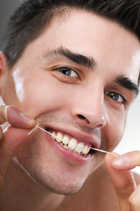 Teeth can be very vicarious to look after: temperamental to manage, then you have the gums to contemplate whilst ensuring you remove all the garbage that you throw at your mouth with regular brushing. But brushing doesn’t really guarantee that you are going to penetrate the tight areas where food can get stuck- right in between the gums and teeth. It’s never easy but if you choose the right dental floss in central Leeds, it can be an added measure to help in the fight against tooth decay and gum disease. First, you have to find a dental floss that works best between your teeth; this may take a while in the beginning to get right but once you have the right one, then it’s all about the technique. Ask your dentist first, but essentially, what you are trying to do is to remove any residue of food from between the teeth and the gums. The aim is to stand in front of a mirror and gently work the floss, between two fingers, in and around until you are sure that all of the teeth are clean and then you can back it up with a rinse with a mouth-wash. Getting the art of flossing right and getting used to doing it will only benefit the health of your teeth and protect you in the long run from others perils that threaten your mouth.
Teeth can be very vicarious to look after: temperamental to manage, then you have the gums to contemplate whilst ensuring you remove all the garbage that you throw at your mouth with regular brushing. But brushing doesn’t really guarantee that you are going to penetrate the tight areas where food can get stuck- right in between the gums and teeth. It’s never easy but if you choose the right dental floss in central Leeds, it can be an added measure to help in the fight against tooth decay and gum disease. First, you have to find a dental floss that works best between your teeth; this may take a while in the beginning to get right but once you have the right one, then it’s all about the technique. Ask your dentist first, but essentially, what you are trying to do is to remove any residue of food from between the teeth and the gums. The aim is to stand in front of a mirror and gently work the floss, between two fingers, in and around until you are sure that all of the teeth are clean and then you can back it up with a rinse with a mouth-wash. Getting the art of flossing right and getting used to doing it will only benefit the health of your teeth and protect you in the long run from others perils that threaten your mouth.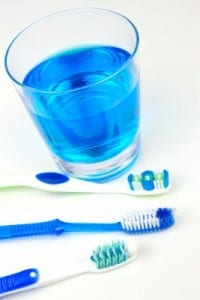 Super markets and pharmacies sell a wide variety of mouthwashes which advertise benefits to oral health. It is the claim if mouthwashes that they are good for stopping gum disease and freshening breath. If you are wondering about whether mouthwashes are effective when it comes to your oral health, you could do worse than ask your dentist in the Leeds area all about it.
Super markets and pharmacies sell a wide variety of mouthwashes which advertise benefits to oral health. It is the claim if mouthwashes that they are good for stopping gum disease and freshening breath. If you are wondering about whether mouthwashes are effective when it comes to your oral health, you could do worse than ask your dentist in the Leeds area all about it. Brushing and flossing should form the bedrock of good oral hygiene but there is more to having good teeth than just this. Many of the other decisions that you take and the things that you do can have a bearing on the health of your teeth. Read on to find about what else you can do to ensure good oral health for many years to come.
Brushing and flossing should form the bedrock of good oral hygiene but there is more to having good teeth than just this. Many of the other decisions that you take and the things that you do can have a bearing on the health of your teeth. Read on to find about what else you can do to ensure good oral health for many years to come. The way you look after your teeth and gums will have a major effect on your dental hygiene. Your dentist plays a part in this and keeping up the routine of having a check up every six months is absolutely critical, but the bottom line is that you should be taking good care of your teeth and gums at home, every day.
The way you look after your teeth and gums will have a major effect on your dental hygiene. Your dentist plays a part in this and keeping up the routine of having a check up every six months is absolutely critical, but the bottom line is that you should be taking good care of your teeth and gums at home, every day.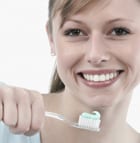 Once it has become part of your daily routine you shouldn’t have to even think very much about how you take care of your teeth. But there are certain things that should be put into practice so that your standards of oral hygiene are the highest they can possibly be. If you are having trouble with any of these things or are worried about your oral health then you should make a point of talking to your local dentist in the Leeds area.
Once it has become part of your daily routine you shouldn’t have to even think very much about how you take care of your teeth. But there are certain things that should be put into practice so that your standards of oral hygiene are the highest they can possibly be. If you are having trouble with any of these things or are worried about your oral health then you should make a point of talking to your local dentist in the Leeds area.

